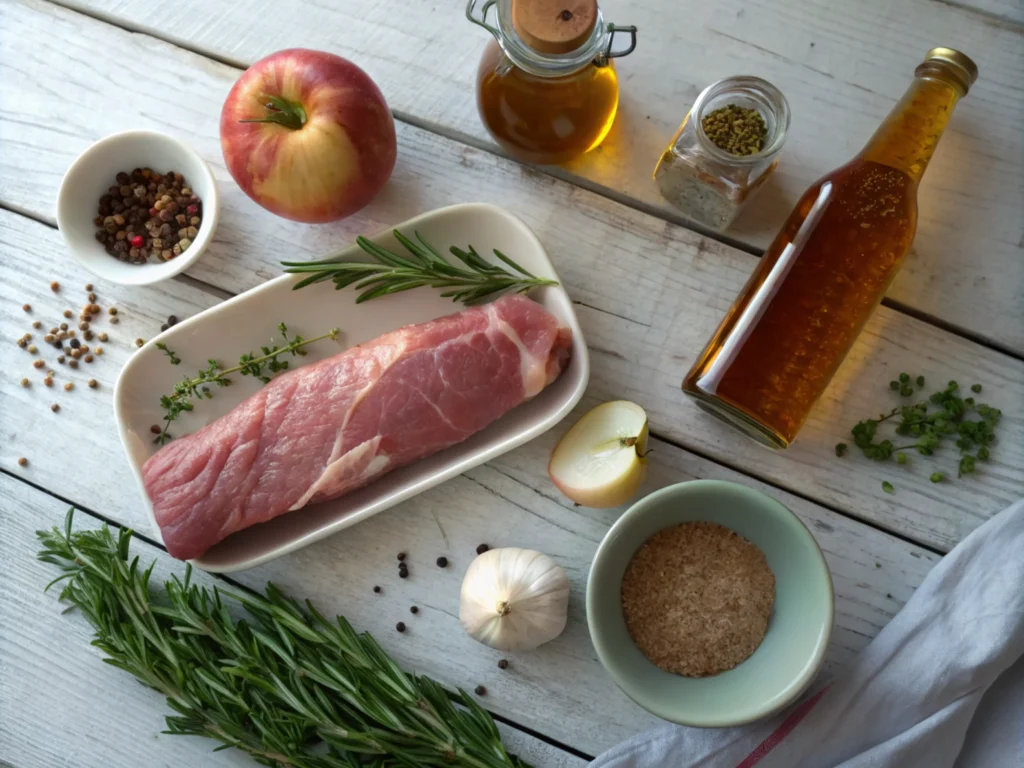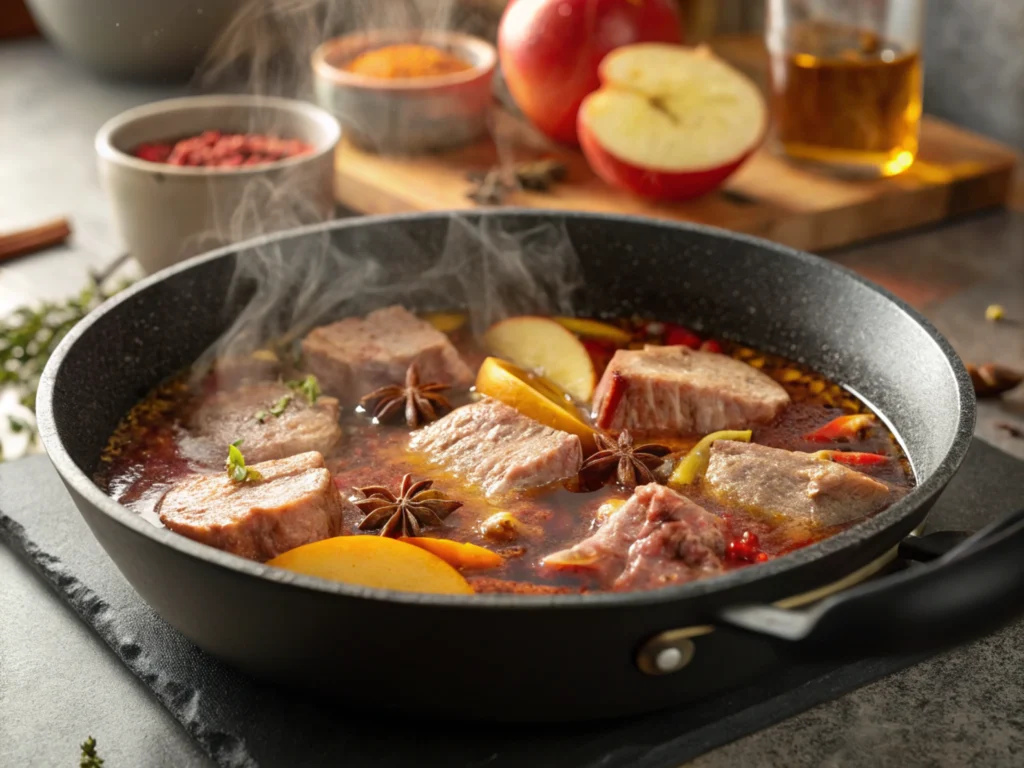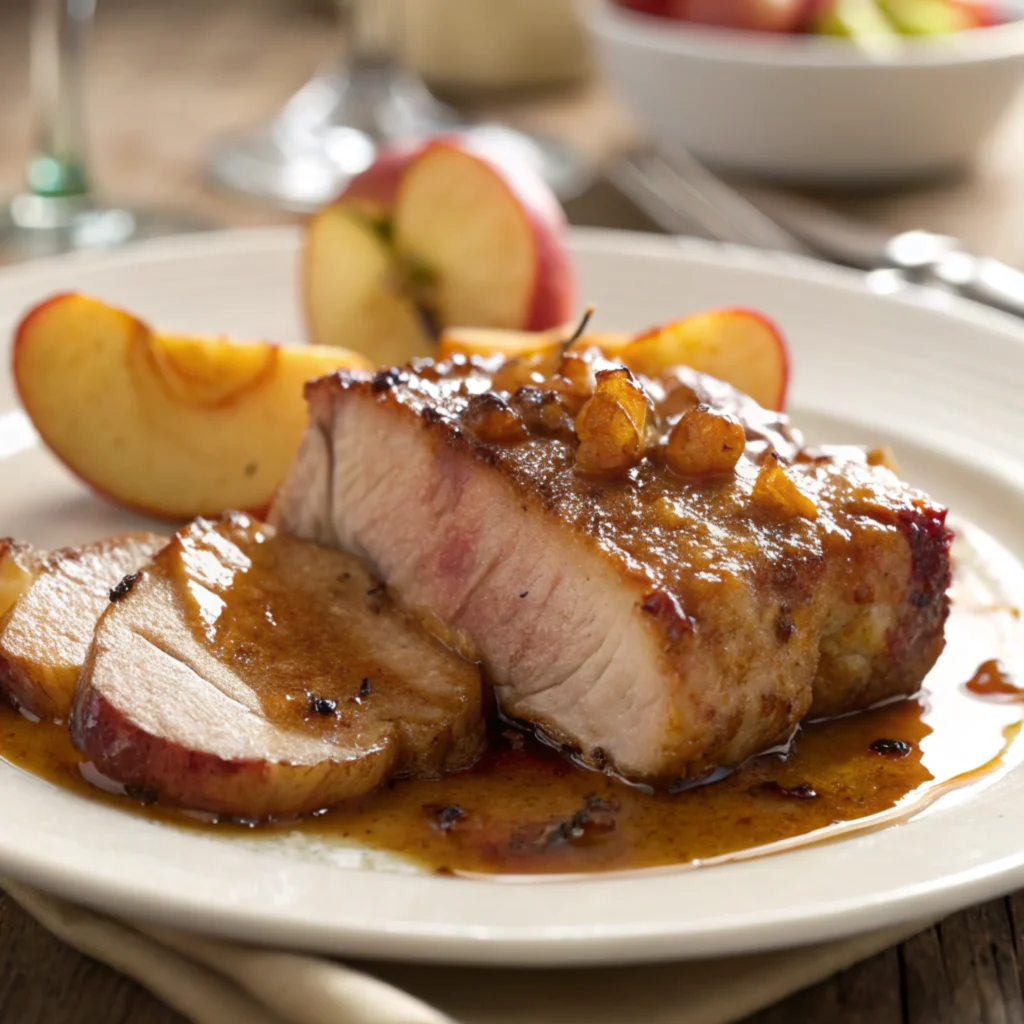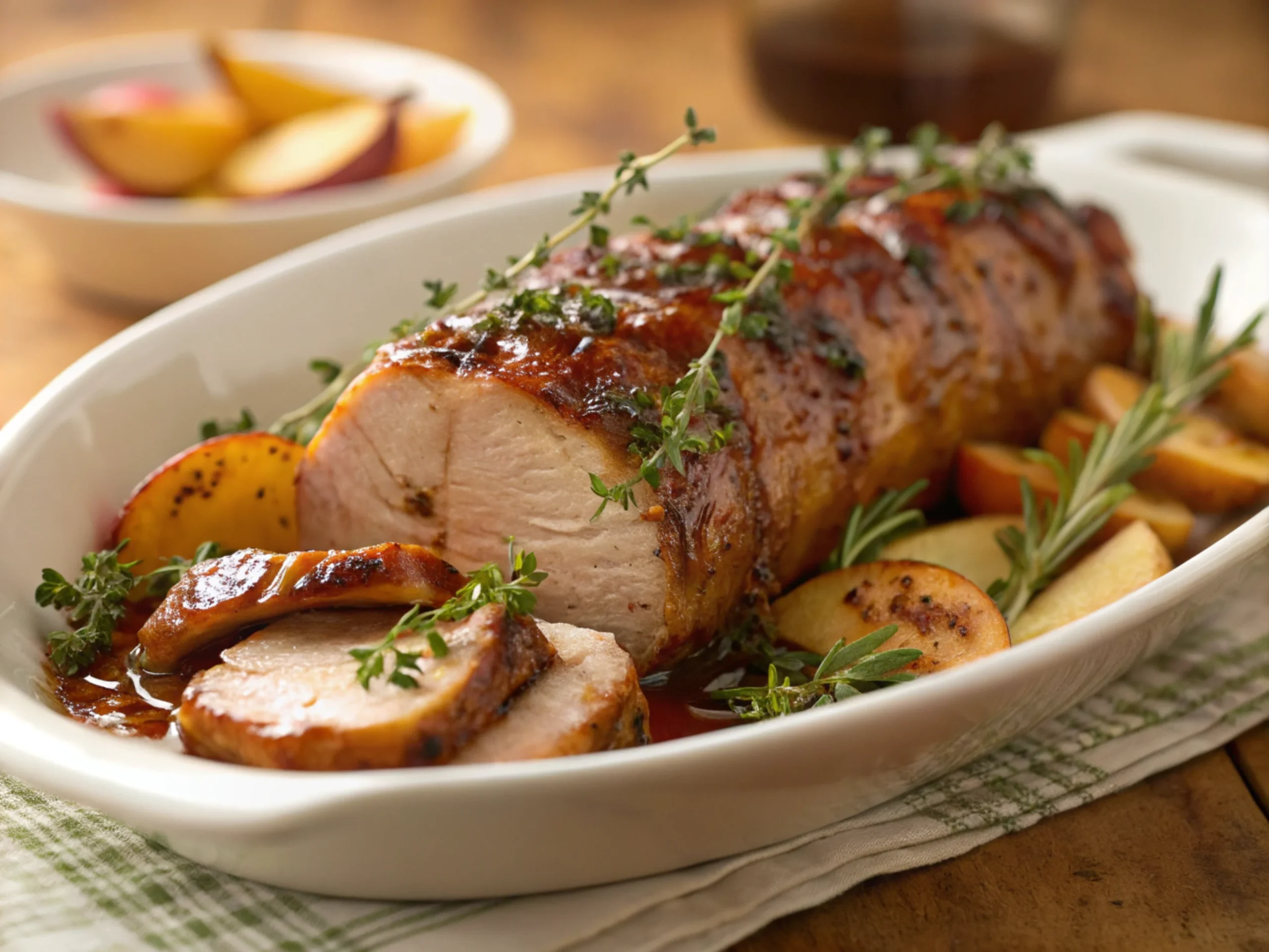What does apple cider vinegar do to pork? Apple cider vinegar has become a staple in many kitchens, celebrated for its ability to transform ordinary dishes into flavorful masterpieces. When it comes to pork, this humble ingredient works wonders, from enhancing tenderness to boosting flavor profiles. Whether you’re marinating a tenderloin or preparing pulled pork, understanding the role of apple cider vinegar can elevate your cooking game. This article explores its benefits, usage tips, and even a delicious recipe to inspire your next meal.
Table of contents
Why is Apple Cider Vinegar Good on Pork?
Apple cider vinegar (ACV) is packed with acetic acid, a compound that breaks down protein fibers in meat. This natural tenderizer ensures your pork stays juicy and soft, even after prolonged cooking. The mild acidity also balances flavors, complementing the richness of pork.
When marinating pork with cider vinegar, its ability to penetrate deep into the meat enhances the absorption of other spices and seasonings. Moreover, its tangy flavor adds a subtle zest that pairs beautifully with pork’s savory notes.
For example, in dishes like Pork and Apple Casserole, ACV not only tenderizes the meat but also melds with the sweetness of apples to create a harmonious balance of flavors.
What Does Apple Cider Vinegar Do to Meat?
Apple cider vinegar isn’t just for pork—it works wonders on all kinds of meat. Its acidic nature lowers the pH level, breaking down the tough connective tissues in cuts like pork shoulder or ribs. This results in tender, melt-in-your-mouth bites that are perfect for slow-cooked recipes.
The vinegar’s ability to enhance juiciness is another reason for its popularity. By locking in moisture, it ensures that your pork dishes are never dry or tough. For instance, marinating pork chops in a mixture of apple cider vinegar, garlic, and rosemary can produce incredibly flavorful results.
Additionally, ACV acts as a flavor amplifier. It heightens the taste of spices like paprika, cumin, or chili powder, making your recipes even more dynamic.
Why Add Apple Cider Vinegar to Pulled Pork?
Pulled pork is a classic dish where apple cider vinegar truly shines. During the slow-cooking process, it helps break down collagen, ensuring the pork shreds effortlessly. More importantly, ACV adds a tangy undertone that cuts through the richness of the meat, creating a balanced flavor profile.
A simple vinegar-based sauce made with ACV, brown sugar, and crushed red pepper can elevate pulled pork to new heights. This sauce, often used in barbecue traditions, not only enhances flavor but also keeps the meat moist during hours of cooking.
Quick Recipe: Pulled Pork with Apple Cider Vinegar
Ingredients:
- 3 lbs pork shoulder
- 1 cup apple cider vinegar
- 2 tbsp brown sugar
- 1 tsp crushed red pepper
- 1 tbsp smoked paprika
- Salt and pepper to taste
Instructions:
- Rub the pork shoulder with smoked paprika, salt, and pepper.
- Place it in a slow cooker and add apple cider vinegar, brown sugar, and crushed red pepper.
- Cook on low for 8 hours, then shred the pork using two forks.
- Serve with the tangy vinegar sauce on buns or over rice.

What Does Apple Cider Vinegar Do to Pork? Effects on Flavor & Texture
Apple cider vinegar not only tenderizes but also plays a crucial role during the cooking process. It helps neutralize any unwanted odors that sometimes accompany pork, ensuring a clean and appetizing dish.
When used in recipes like marinades or glazes, ACV also acts as a binding agent, allowing spices and herbs to cling to the pork. This creates a flavorful crust when the meat is seared or roasted.
In addition to enhancing flavor, vinegar prevents oxidation, keeping pork looking fresh and vibrant even after long cooking sessions. This is especially beneficial in recipes like ribs or pork roasts, where presentation matters as much as taste.
Recipe Spotlight: Apple Cider Pork Tenderloin
One of the best ways to showcase apple cider vinegar’s versatility is through a marinated pork tenderloin recipe. This dish highlights its ability to tenderize, flavor, and elevate even the simplest of ingredients.

Ingredients:
- 1 lb pork tenderloin
- ½ cup apple cider vinegar
- 2 tbsp olive oil
- 1 tbsp Dijon mustard
- 1 tsp garlic powder
- 1 tsp thyme
- Salt and pepper to taste
Instructions:
- In a bowl, whisk together apple cider vinegar, olive oil, Dijon mustard, garlic powder, thyme, salt, and pepper.
- Place the pork tenderloin in a resealable bag and pour the marinade over it. Seal and refrigerate for at least 4 hours.
- Preheat the oven to 400°F. Remove the pork from the marinade and pat it dry.
- Sear the tenderloin in a hot skillet until browned on all sides, then transfer to the oven.
- Roast for 20 minutes or until the internal temperature reaches 145°F.
- Let the meat rest for 5 minutes before slicing.
This recipe pairs beautifully with roasted vegetables or a crisp apple salad, making it perfect for any occasion.
How to Use Apple Cider Vinegar in Pork Recipes (Tips & Tricks)
Apple cider vinegar is a remarkably versatile ingredient that can elevate your pork recipes with its ability to tenderize and enhance flavor. Its unique combination of acidity and mild sweetness makes it a favorite in both classic and innovative dishes. Below are comprehensive tips and techniques to help you make the most of cider vinegar when cooking pork.
Marination Tips
Marinating pork with apple cider vinegar is one of the simplest yet most effective ways to transform its texture and taste. Here are some essential marination tips:
- Time it Right: Allow pork to marinate in a mixture that includes apple cider vinegar for 2 to 4 hours. For tougher cuts like shoulder or ribs, marinating for up to 6 hours may be beneficial. Avoid marinating overnight to prevent the meat from becoming overly acidic or mushy.
- Balance Flavors: Since apple cider vinegar is tangy, balancing it with sweet elements like honey, brown sugar, or orange juice creates a harmonious flavor. These combinations highlight the pork’s natural richness while adding depth to the dish.
- Use Fresh Herbs: Enhance your marinade by adding herbs like rosemary, thyme, or sage. The acidity of the vinegar helps release the oils from the herbs, infusing the pork with complex flavors.
- Even Coating: Place the pork and marinade in a resealable plastic bag. This ensures an even coating and allows the marinade to reach every part of the meat. Turn the bag occasionally for optimal flavor distribution.
Cooking Tips
Cooking pork with apple cider vinegar takes the meat to another level. Here are some ways to incorporate it into your cooking process:
- Deglazing: After searing pork in a pan, add a splash of apple cider vinegar to deglaze. This not only lifts the flavorful bits stuck to the pan but also creates the base for a rich sauce. Add stock or butter for a luxurious finish.
- Basting: While grilling pork, use a mixture of apple cider vinegar, olive oil, and herbs as a basting liquid. Basting regularly keeps the meat moist and adds a glossy finish.
- Glazes and Sauces: Combine apple cider vinegar with maple syrup, mustard, or soy sauce to create a tangy and sweet glaze. Brush it over pork during the last 10 minutes of cooking for a beautiful caramelized crust.
- Moisture Locking: Use apple cider vinegar as a braising liquid in slow-cooked dishes. It helps break down the meat’s fibers, resulting in tender, melt-in-your-mouth textures.
Pairing Suggestions
Pairing apple cider vinegar with complementary ingredients enhances its impact on pork recipes. Below are some pairings to consider:
- Sweet Fruits: Apples, pears, or peaches work wonderfully with the tanginess of apple cider vinegar, creating a balance of sweet and savory. Add these fruits to your marinades or serve them as a side dish.
- Spices and Aromatics: Spices like smoked paprika, cumin, and garlic blend seamlessly with apple cider vinegar, adding warmth and complexity to the dish.
- Vegetables: Use apple cider vinegar in recipes featuring root vegetables like carrots or parsnips. These vegetables absorb the vinegar’s tangy notes, complementing the pork perfectly.

Pro Tips & Variations
Cooking with apple cider vinegar isn’t just about following a recipe—it’s about experimenting and discovering new ways to elevate your dishes. Here are some professional tips and creative variations to inspire your next pork recipe:
Pro Tips
- Create a Flavor Paste: Mix smoked paprika, cumin, and a splash of apple cider vinegar to form a thick paste. Rub it generously onto pork ribs or chops before grilling. This technique creates a crust packed with bold flavors.
- Herb-Infused Vinegar: Soak fresh herbs like basil, thyme, or oregano in apple cider vinegar for a week. Use the infused vinegar as a marinade or dressing for a subtle herbal note.
- Pressure Cooking Shortcut: When using a pressure cooker, add apple cider vinegar to the cooking liquid. This method quickly tenderizes the meat while infusing it with robust flavors.
- Sous Vide Perfection: Add a tablespoon of apple cider vinegar to your vacuum-sealed bag when cooking pork sous vide. This locks in the flavor and ensures a juicy result.
Creative Variations
- Asian-Inspired Marinade: Mix apple cider vinegar with soy sauce, sesame oil, and ginger for a tangy, umami-packed marinade. Use it on pork belly or spare ribs for an irresistible flavor.
- Spicy Twist: Combine apple cider vinegar with chili flakes, garlic, and lime juice to create a spicy marinade for grilled pork skewers.
- Barbecue Bliss: Add a splash of apple cider vinegar to your barbecue sauce. It balances the sweetness of the sauce and enhances the smoky flavors of grilled pork.
For more inspiration, check out this creative approach to using apple cider vinegar in baked goods, such as Kefir Sheet Cake, which pairs tangy elements with unexpected sweetness.

FAQs About Apple Cider Vinegar and Pork
Why is apple cider vinegar good for tenderizing pork?
Apple cider vinegar contains acetic acid, which breaks down the protein fibers in meat. This process makes the pork tender and juicy, even for tougher cuts like shoulder or ribs.
How long should pork marinate in apple cider vinegar?
Pork should marinate in cider vinegar for 2 to 4 hours. For tougher cuts, up to 6 hours is fine, but avoid marinating overnight to prevent an overly acidic taste or mushy texture.
Can apple cider vinegar make pork too sour?
Yes, using too much apple cider vinegar or marinating the pork for too long can make it overly tangy. To avoid this, balance the vinegar with sweet ingredients like honey or brown sugar.
What are the health benefits of using apple cider vinegar in cooking?
Apple cider vinegar is rich in acetic acid, which aids digestion and enhances nutrient absorption. It also contains antioxidants that can support overall health.
Is apple cider vinegar better than other types of vinegar for pork?
Apple cider vinegar’s mild tang and slight sweetness make it ideal for pork recipes. It complements the meat’s richness better than harsher vinegars like white or malt vinegar.
Can apple cider vinegar remove gamey flavors from pork?
Yes, apple cider vinegar neutralizes strong, gamey odors, making it especially useful for cuts like pork belly or chops.

Conclusion
Apple cider vinegar is a powerhouse ingredient that transforms pork dishes with its tenderizing and flavor-enhancing properties. Whether you’re slow-cooking pulled pork, grilling ribs, or preparing a succulent roast, apple cider vinegar ensures tender, juicy results every time. Its versatility allows it to pair seamlessly with a variety of spices, fruits, and vegetables, making it an essential tool in any cook’s repertoire.
By incorporating apple cider vinegar into your pork recipes, not only can you elevate their flavor profiles, but also you can create dishes that leave a lasting impression on your family and friends with every bite. From marinades to glazes, this versatile ingredient proves that small additions can make a big impact. The next time you’re in the kitchen, reach for apple cider vinegar and watch your dishes come to life.
For insights on how vinegar is used in meat processing and preservation, check out Health Canada’s guidelines on modified vinegar as a preservative


1 thought on “What Does Apple Cider Vinegar Do to Pork? Benefits and Recipes”